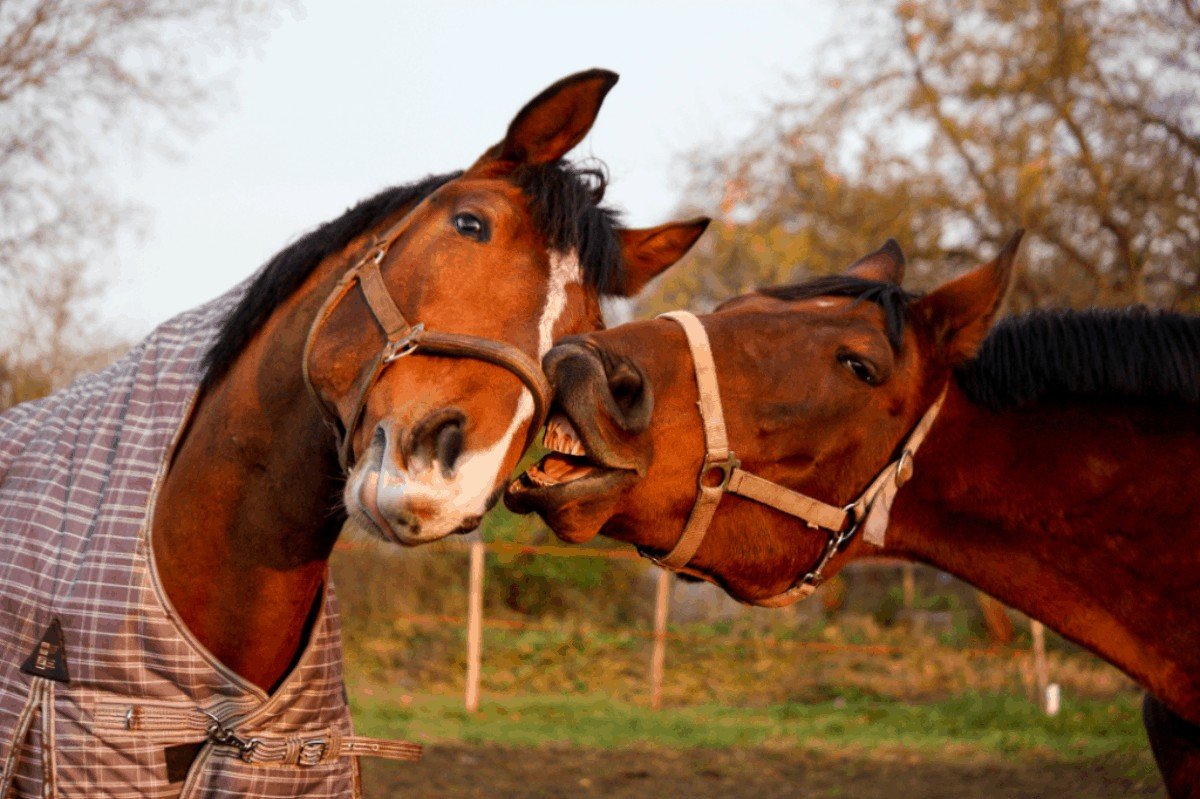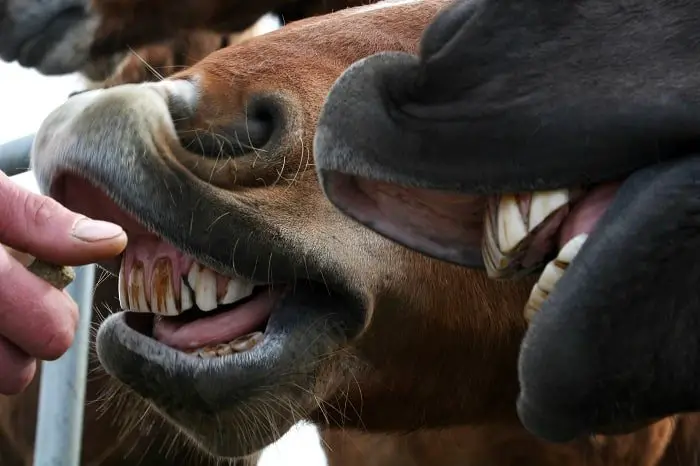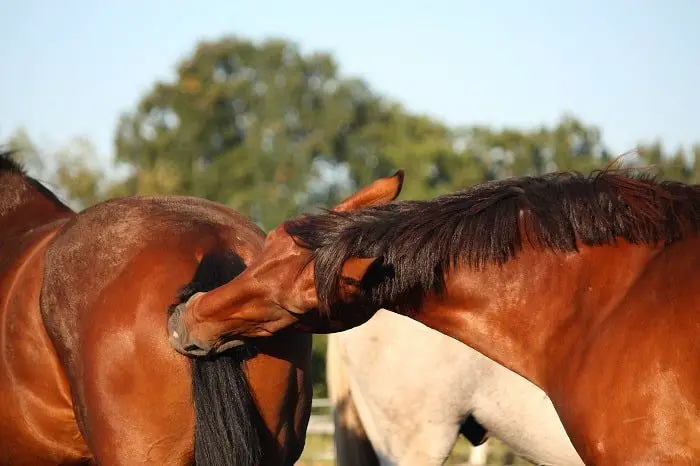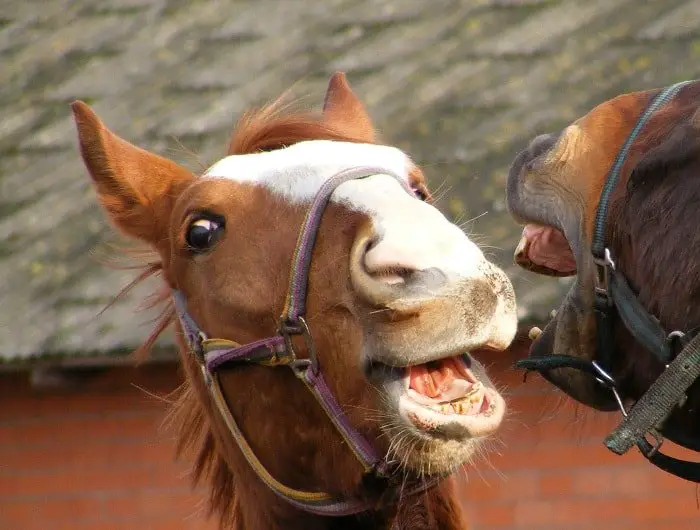Last Updated on December 20, 2021
There can be many reasons why a horse may bite. No matter what the reason may be, getting bit by a horse can be very painful. If you have a horse that bites, you want to know how to stop a horse from biting.
Horses have a powerful bit, so if you get bit you are likely to have a nasty bruise afterward. Having a horse that bites can be problematic, as it can become a liability. Taking measures to stop your horse from biting will help you and your horse’s relationship.
How Can I Stop My Horse From Biting?
A horse may bite for several reasons. They can bite out of fear, anger, discomfort, play, dominance, desire for treats and annoyance, among other things. No matter what the reason may be, being bitten by a horse is a nuisance.
Understanding Why a Horse is Biting
To stop your horse from biting, you must first understand why your horse is biting you. This will help you to be able to follow the proper steps to prevent them from biting. Their bites can be anything from friendly, playful affection to fear and aggression.
Friendly and Playful Biting
Some horses, especially younger horses or stallions, will bite you in a playful manner. Horses often bite their herd mates in a playful manner, as a way to interact with each other. When a horseplay bites, they generally will have their ears forward and nibble you as a way to have fun.
If your horse is playing to bite you, they see you as an equal, a playmate like their pasture buddies. If this is the case, you need to teach your horse that you are a leader, rather than a playmate.
Teach your horse to respect your boundaries. It is important to teach your horse to move their feet while you are still and direct them the way you want them to move, they will have more respect for you.
If your horse is naturally playful and energetic, it is a good idea to provide them with toys, exercise, and adequate turnout. This will help your horse manage their playful energy in a positive way, instead of biting you.
Biting for Treats and Affection
Many horses love to get treats. Treats can be a great way to reward your horse and even help in some training. However, some horses will anticipate or beg for treats by biting, which is problematic.
Hand feeding horses’ treats can be used as a positive reinforcement when done in moderation. However, if your horse becomes pushy or bites, you may need to reduce hand-fed treats or only give treats in a feeding trough. It is important to have your horse respect you and not get pushy when it comes to giving treats.
Biting Out of Fear
Some horses, especially those who have been mistreated in the past, may bite out of fear. They may also bite out of fear from an accident, being nervous they may get hurt again. Fortunately, there are some steps to take to help your horse get over their fears.
Time and patience are the most important things when dealing with a horse that is scared. It is very important to understand why your horse is scared and learn what you can do to prevent it from happening again.
Teach your horse that you are a leader and someone they can trust. Don’t react by swatting your horse if they bite you as that is likely to make the situation worse. Work to build up your horse’s confidence and trust.
Biting from Aggression and Dominance
Horse may bite out of aggression. Aggression may relate to fear, as a horse can lash out when it is scared. Aggression may also come out of a horse trying to assert dominance.
Stallions are known to more aggressive due to their hormones. Stallions that are not handled correctly are more likely to bite out of aggression. It is important to make sure you are properly handling your stallion to lessen the chances of them biting.
Make sure your horse is properly socialized, is taught proper manners, regularly exercised and not in pain. This will help an aggressive horse have better manners, which makes them less likely to bite.
Biting from Discomfort and Annoyance
If a horse is experiencing discomfort or is annoyed, biting is one of their ways of dealing with these issues. One of the most common times a horse will bite out of discomfort and annoyance is when getting their girth tightened.
A horse may bite when getting their girth tightened because it hurts, the saddle does not fit right, they are not used to the saddle or they are not wanting to give to the pressure. If your horse bites when you saddle it, consult your veterinarian to make sure they are not in pain and make sure your saddle fits right.
To help your horse from biting you when tightening their girth, make sure to do it in a slow manner. Work with your horse to get used to the feeling and make sure they are not in any pain.
Horses may also bite if they are annoyed. If your horse does not want to do what you are asking, they may resort to biting. Working on ground manners can help your horse to respect you and teach them that biting is not an appropriate response when they don’t want to do what you ask.
Stopping Your Horse from Biting
Though biting is annoying and can even be dangerous, it is a horse’s way of communicating. Though people may think smacking a biting horse is a good way to stop them from biting, it will likely just cause more problems. In order to stop your horse from biting is to understand why they are biting.
Please comment if you enjoyed this article or have any remarks regarding this post!
To stop your horse from biting:
- Teach them good ground manners and to respect you as their leader
- Make sure there are no underlying issues, such as pain
- Give them regular exercise
FAQs
What happens if a horse bites you?
If your horse bites you, immediately wash the wound with soap and water. Seek immediate medical attention. The bite may need to be treated with antibiotics to prevent infection.
If a horse bites you, you should try to figure out the reason why this happened so you can prevent this kind of behavior in the future. Some horses has aggressive tendencies or can be a bit mischievous. But more often this may be an indication that the horse needs to be treated differently or that he feels uncomfortable around you. It's also possible that your horse is afraid of you and he's trying to protect himself when you approach him. It can help to hire a trainer who can teach you how to take a better control of your horse.
Why does my horse bite me when I groom him?
Biting or nipping is a way horses use to tell you they don't like something. In case of grooming could be something that is causing them discomfort or pain. It's possible that there is a painful spot on horse's back caused by the saddle and every time that you brush through it, intensifies the pain. Other possible reasons can be a too tight bridle, a too loose bit, a dirty saddle pad, or a girth that is tightened too quickly. Try tightening the girth in smaller increments to exclude this possibility.
If you're sure that none of that is a reason for biting, you should consult with your vet. There might be a hidden injury you can't see or maybe your horse is suffering from painful joints or a pulled muscle. Also inspect your horse's teeth regularly and float them when necessary.
How painful is a horse bite?
A sharp, burning sensation can be caused by a horse bite. Bitten area can be very painful for up to several days and can cause swelling, bruising, and redness. In rare cases, horse bite can lead to severe complications such as infection, blood clots, or nerve damage.
How do you teach a foal not to bite?
The best way to teach a foal not to bite is to start when he is still a baby. Take care of him with love and attention. Teach him that when he comes to you for attention or cuddling, you'll give him that, but you'll also take away his nosing and nudging when he comes too close. He won't get used to this treatment and will eventually give up.
One way of achieving that is to hold his nose just a little longer than he wants, so that he takes his nose away on his own. Repeat the gesture each time he comes towards you in the same biting manner. Be careful to not hurt him but consistent until he gives up on trying to bite.
You can also try to teach a horse not to bite by using a trick called 'the pinch'. When you want your horse to stop doing something, you should use the pinch. Pinching is a way of stopping a behavior, that doesn't harm the horse. You can pinch your horse in the nose, between his eyes, on his back, under the tail, or at the top of his leg.
Michael Dehaan is a passionate horse owner, horse rider, and lover of all things equine. He has been around horses since he was a child, and has grown to become an expert in the field. He has owned and ridden a variety of horses of different breeds, and has trained many to compete in shows and competitions. He is an experienced horseman, having worked with and competed many horses, including his own. He is an active member of the equestrian community, participating in events and teaching riding lessons.




